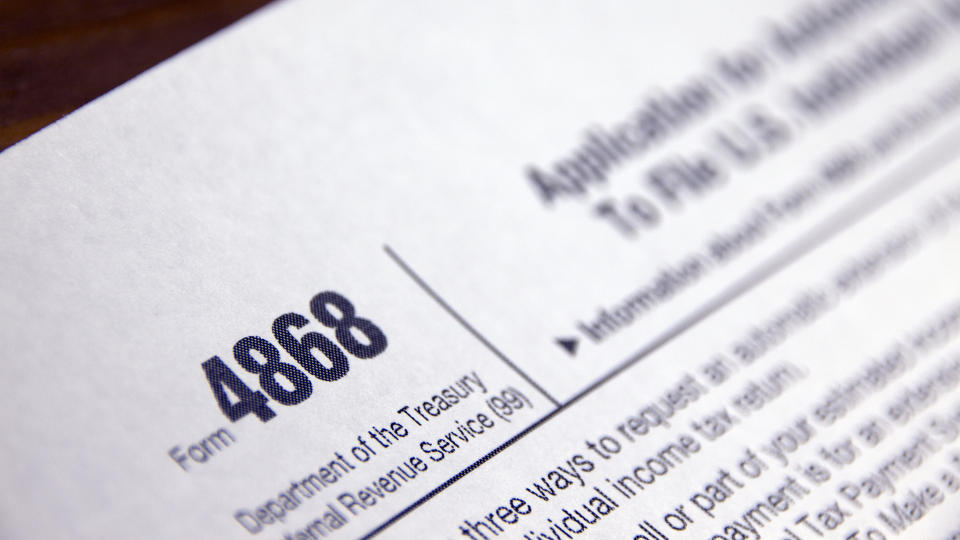The Pros and Cons of Filing for a Tax Extension

The April 18 tax deadline is rapidly approaching — and if you’ve procrastinated filing, you’re likely feeling the crunch. If you don’t think you’ll be able to make the deadline, you do have the option to file a tax extension, which will give you until Oct. 16 to file. For individuals, this can be done by filling out Form 4868, which can be submitted online for free.
See the List: GOBankingRates’ Best Banks of 2023
Do You Have a Money Question? Ask an Expert
It’s important to note that this is an extension to file, not an extension to pay any taxes owed. You should estimate and pay any owed taxes by April 18 to avoid possible penalties. And you need to file your extension request no later than Tax Day. But before you do, be mindful of the pros and cons of filing a tax extension.
Pro: You’ll Avoid Late Filing Fees
If you don’t file for a tax extension and fail to file by Tax Day, you’ll be hit with a “failure to file” fee equal to 5% of the unpaid taxes for each month or part of a month that a tax return is late.
“If you need additional time to complete your tax return, by filing the extension form with the IRS, you can avoid late filing penalties imposed by the IRS,” said Joanna Powell, CPA, CFP, managing director at CBIZ MHM. “As stated above, you still need to pay your tax on time, so if you file an extension but don’t make the payment, you can still be subject to late payment penalties.”
Pro: Other Deadlines Get Extended, Too
When you extend your tax filing deadline, there are other deadlines that are automatically extended as well.
“One of these is the deadline to fund a self-employed retirement plan,” Powell said. “Self-employed retirement contributions are deductions on your tax return. However, you have until the due date, including extensions, to fund for the year. For example, a 2022 self-employed retirement contribution needs to be paid by April 18, 202[3], or Oct. 16, 202[3], if you file an extension. This gives taxpayers additional time to get the funds to contribute and take as a deduction on a 202[2] tax return. You also have extended the time to make certain elections on your income tax return.”
Take Our Poll: What Do You Plan To Use Your Tax Refund For?
Pro: It Gives You More Time To Double-Check Your Tax Return
If you’re rushing through to get your taxes filed on time, you may make some mistakes — especially if you’re unfamiliar with the changes to tax laws that went into effect in recent years.
“With tax reform in 2017 and the more recent tax law updates during the COVID-19 pandemic, tax law has changed and been updated quite a bit,” Powell said. “It may be advantageous to request an extension of time to file to give yourself time to carefully review your return. Alternatively, you can hire a CPA to review your return and ensure you are reporting all income items properly, getting all the deductions you are entitled to and making any necessary elections for the current tax year.”
Many CPAs will be fully booked up through Tax Day at this point, so if you want an accountant to review your tax return, you will likely need to file an extension.
Con: It Will Delay Your Tax Refund
If you are owed money back from the IRS, you’ll have to wait longer to get that refund check the longer you wait to file.
“If you have an overpayment of taxes on your return, and you don’t intend to apply that overpayment to next year’s taxes, the one major disadvantage to filing an extension is it will take longer to get your refund back,” Powell said.
Con: Your Taxes Will Remain on Your To-Do List for Another 5 Months
“It is my opinion that a tax extension provides no benefit to the taxpayer given that payment in full is still due on the filing deadline,” said Sallie Mullins Thompson, CPA. “Extensions are useful only in situations where tax documents are late, lost or damaged and have yet to be received and/or need to be recreated. Taxpayers using the extension to procrastinate gathering their data are doing themselves a disservice, I think.”
More From GOBankingRates
This article originally appeared on GOBankingRates.com: The Pros and Cons of Filing for a Tax Extension
